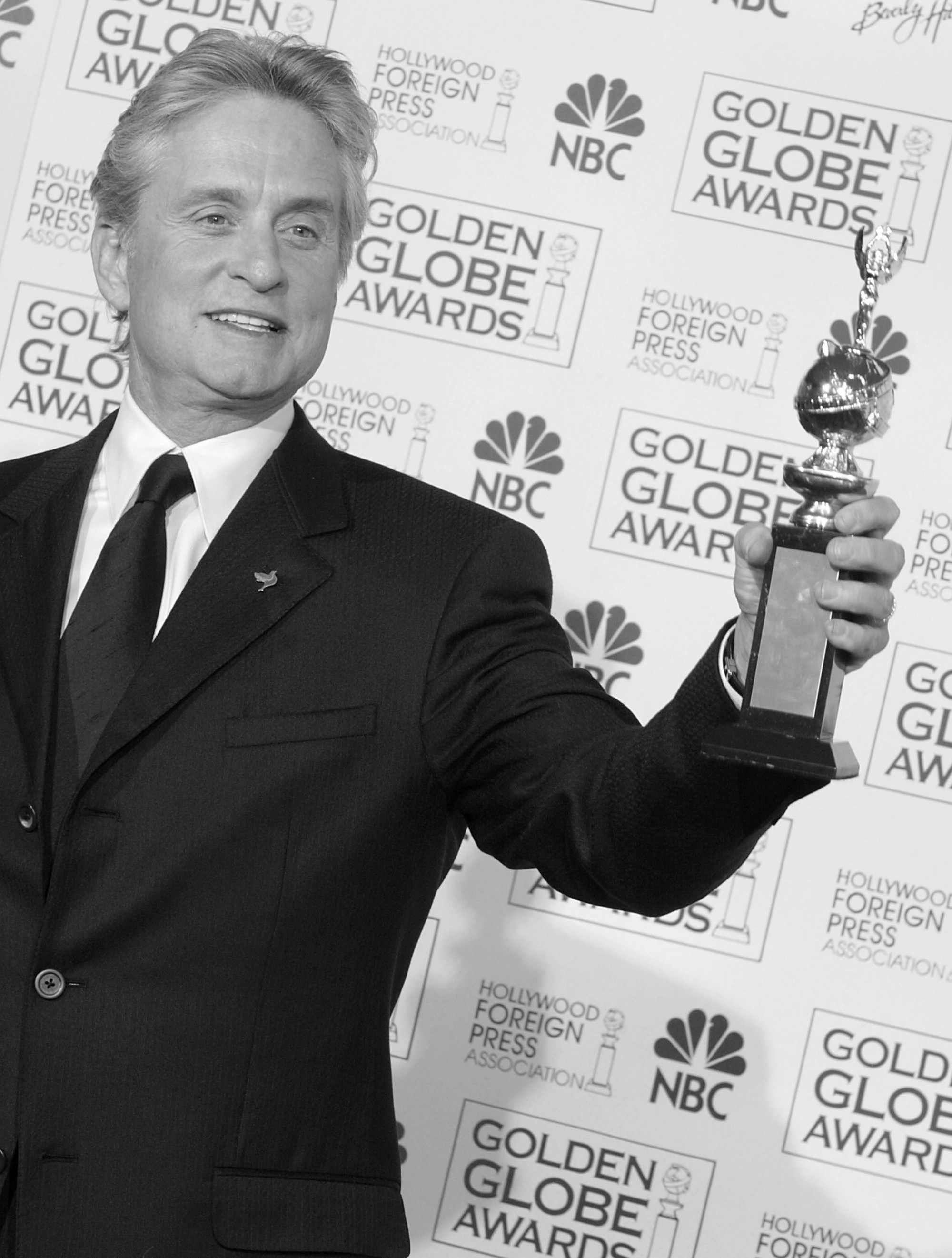
- Cecil B. DeMille
Ready for My deMille: Profiles in Excellence – Michael Douglas, 2004
Beginning in 1952 when the Cecil B. deMille Award was presented to its namesake visionary director, the Hollywood Foreign Press Association has awarded its most prestigious prize 66 times. From Walt Disney to Bette Davis, Elizabeth Taylor to Steven Spielberg and 62 others, the deMille has gone to luminaries – actors, directors, producers – who have left an indelible mark on Hollywood. Sometimes mistaken with a career achievement award, per HFPA statute, the deMille is more precisely bestowed for “outstanding contributions to the world of entertainment”. In this series, HFPA cognoscente and former president Philip Berk profiles deMille laureates through the years.
Michael Douglas has always lived in the shadow of his famous father, Kirk Douglas, but over a career that has spanned 50 years, he can boast an equally impressive filmography.
After attending the élite Choate Prep School, Douglas headed off to UC Santa Barbara, where he majored in theater. After graduation, he studied at the American Place Theater and Neighborhood Playhouse, then made his screen debut in a CBS Playhouse production of The Experiment. He was cast in his first feature film Hail, Hero, for which he was nominated for a Golden Globe as Most Promising Actor. He was 25 at the time, and he had earned his stripes.
He landed two other movies including Summertree, based on an acclaimed Broadway play, which led to Quinn Martin hiring him for the hit TV series, The Streets of San Francisco. It ran for three years and earned him nominations for both a Golden Globe and an Emmy. Those years working with Karl Malden were formative, and soon he was ready for the big time, but not as an actor. As a producer, he teamed up with Saul Zaentz, having secured the screen rights to the cult novel “One Flew Over the Cuckoo’s Nest” from his father who owned the rights and had tried unsuccessfully to make that film.
The film, of course, won five Oscars and six Golden Globes including Best Picture, which he shared as one of the producers. One Flew Over The Cuckoo‘s Nest became the movie of the decade and sealed the careers of director Milos Forman and Jack Nicholson, grossing $180 million worldwide. Michael continued producing films including The China Syndrome and Romancing the Stone (both of which he also starred in). There were others including Flatliners and Face/Off that were not quite as successful, yet when asked at an HFPA press conference why he continued to produce, his answer was assured. “I enjoyed the thrill or the excitement in asking myself, ‘Am I crazy? I like it, but is there anybody else out there who’s going to like this movie?’ So, the motivation is that thrill, that risk, that challenge to pull this off.”
For a while, his acting career sputtered. He appeared in minor efforts like Running and It’s My Turn, and regrettably in Richard Attenborough’s A Chorus Line: The Movie, but there were also crowd-pleasers like Jewel of the Nile. But then a spate of provocative titles earned him the title Male Sex Symbol. He became the prototype of the clean-cut American male victimized by aggressive women, Glenn Close in Fatal Attraction, Kathleen Turner in The War of the Roses (for which he was nominated for a Golden Globe as Best Actor in a Motion Picture Comedy) Sharon Stone in Basic Instinct, and Demi Moore in Disclosure.
In between, he found time to play the anti-hero in Oliver Stone’s Wall Street which earned him his acting Golden Globe, an Oscar, and screen immortality by virtue of Gordon Gekko’s credo, “Greed Is Good.”
He was suave and convincing playing The American President, for which he earned his fifth Golden Globe nomination as Best Actor in a Comedy; he was poignant playing an aging college professor in Wonder Boys, for which he also earned his sixth Golden Globe nomination, this time as Best Actor in a Drama, and he led an all-star cast in Steven Soderbergh’s Traffic, which won the Oscar as Best Picture.
He played Gordon Gekko again in Oliver Stone’s Wall Street: Money Never Sleeps, for which he earned his seventh Golden Globe nomination.
After that, he struggled with mediocre projects. It was only after a bout with cancer, which he has successfully fought, and a chance to play Liberace, that his career took off again. He won both the Golden Globe and the Emmy for that role working again with Soderbergh (Behind the Candelabra) and since then he has made a career out of playing Hank Pym in the Marvel blockbusters Ant-Man, Ant-Man and the Wasp, and Avengers End Game. Last year he returned to television with the Netflix series The Kominsky Method, for which he earned his fourth and fifth Golden Globe Award as Best Actor in a TV series.
Asked if there’s an upside to aging? he volunteered: “The positive aspect, I think, is it allows you to choose how you spend your time rather than letting life hit you and go with the flow. So, you wake up in the morning and you think about your week, and what are you going to do or how are you going to spend your time. So, there’s much more a sense of planning your time because all of a sudden, you don’t have this infinite amount of time, you have a finite amount of time now. You’re working.”
Michael Douglas and Kirk Douglas are the only father-son Cecil B. deMille winners. Kirk, of course, passed away this year at the age of 103.
Michael’s classic movies: One Flew Over the Cuckoo’s Nest, Wall Street, The China Syndrome

